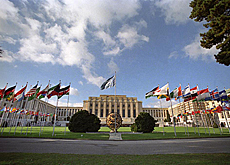Mohammed cartoons derail talks on rights body

Talks to establish a new United Nations human rights body in Geneva have been thrown into disarray by Muslim calls for new clauses against blasphemy.
Fifty-seven Islamic nations have demanded the insertion of three amendments following the controversy over cartoons of Mohammed published in a Danish newspaper.
Jan Eliasson, president of the UN General Assembly, has been conducting “intensive” bilateral talks with key UN members in an effort to resolve severe splits on the new rights body, according to his spokeswoman, Marie Heuzé.
Heuzé said the aim had originally been to get the final resolution on the new body – which is set to replace the discredited Geneva-based UN Human Rights Commission – adopted on Wednesday so it could begin to function this summer.
The proposed Human Rights Council is based on a model drawn up by Swiss human rights expert, Walter Kälin.
Talks were derailed when leading members of the 57-nation Organization of the Islamic Conference (OIC) added new conditions to the already heated debate over the rights body, diplomats and UN officials said.
Defamation
In the document handed to the UN on Monday, the OIC said “the defamation of religions or prophets is not in accordance with free speech” and that states, organisations and media “had a responsibility to promote tolerance and respect for religious and cultural values”.
The OIC told UN Secretary-General Kofi Annan that language against blasphemy should be written into the tenets for a human rights council. So far, Western nations as well as UN officials are resisting such a move.
World leaders agreed at a UN summit in September to create a new body to replace the 53-member Commission on Human Rights, known for giving seats to countries such as Sudan and Zimbabwe and blocking criticism of rights abusers.
Some US congressmen want to make a new rights body a condition for paying UN dues.
A draft resolution calls for rights criteria for candidates, geographic representation and 45 members.
Still undecided is whether a candidate would be elected by a two-thirds or a simple majority. The United States and the Europeans wanted a two-thirds vote, which would make it easier for them to stop a nation from getting a seat.
Paragraph by paragraph
Eliasson is hoping for a consensus resolution rather than calling a vote, although many envoys say that will be difficult. The landmark 1948 Universal Declaration of Human Rights was voted on paragraph by paragraph.
The Swiss have been lobbying hard for the new body to be based in Geneva, and last week the Swiss foreign ministry said opposition to Geneva’s bid to host the Council had faded.
“We are in the process of resolving logistical issues and the question of office space. We hope this can all be sorted out within the next few months,” said Blaise Godet, Switzerland’s ambassador to the UN in Geneva.
swissinfo with agencies
On September 30, 2005 12 satirical cartoons each featuring Mohammed appeared in the Danish daily newspaper Jyllands-Posten.
The images provoked a wave of protests in the Muslim world, with many condemning the cartoons as an outrage as Islamic tradition bans depictions of the prophet or Allah.
The cartoons were reprinted by several European newspapers, including a number of Swiss publications.
The Human Rights Commission was established in 1946 and is currently made up of representatives from 53 countries nominated by regional groupings.
It meets every year for a six-week session in Geneva to assess the human rights situation around the world.
The proposed Human Rights Council is based on a model drawn up by Swiss human rights expert Walter Kälin.
UN Secretary-General Kofi Annan said during a trip to Switzerland in October that the new body would also be based in Geneva.

In compliance with the JTI standards
More: SWI swissinfo.ch certified by the Journalism Trust Initiative











You can find an overview of ongoing debates with our journalists here . Please join us!
If you want to start a conversation about a topic raised in this article or want to report factual errors, email us at english@swissinfo.ch.